What Do Chipmunks Eat?
Chipmunks are opportunistic eaters. What do chipmunks eat? In short, chipmunks eat insects, snails, nuts, berries, seeds, fruit and grain. They can carry nine nuts at a time. It might be a better question to ask what don’t they eat. Chipmunks will eat a wide variety of plant life and small bugs. The chipmunk diet has a great deal of variety. Eastern chipmunks spend a lot of time gathering and storing food for the winter. They slowly gnaw away at their summer bounty throughout the winter.
Chipmunks are small, omnivorous mammals that are native to North America and Eurasia. They are known for their distinctive stripes and their ability to climb trees and burrow underground.
Chipmunks will eat a wide variety of foods depending on what is available in their environment. In the wild, chipmunks primarily eat seeds, nuts, berries, and other plant material. They also occasionally eat insects and small invertebrates, such as snails and worms.
Chipmunks are known to cache, or store, food for later use, and they will often bury seeds and nuts in the ground to save for leaner times. In addition to gathering food from plants and insects, chipmunks will also occasionally raid bird feeders and gardens to find additional food sources.
In captivity, chipmunks can be fed a diet of commercial dry or wet food formulated for small mammals, supplemented with fresh fruits and vegetables. It is important to provide chipmunks with a balanced diet that meets their nutritional needs and to avoid overfeeding them.
What Do Chipmunks Eat if They Could Choose Their Diet?
Chipmunks would probably eat nuts and seeds if they were given the choice above all other things. Many type of grains, small seeds, and the occasional fungi and worms would be the ideal chipmunk diet. Of course no healthy rodent diet is without the random plant, grass, and (ideally) fresh fruits and vegetables.
There are about 20 species of western chipmunks and one species of eastern chipmunk in USA and Canada. They can be found in woodlands, forest edges, bushes, gardens, parks, around houses or cemeteries.
Eastern chipmunks mate two times a year, during early spring and again during the summer or early fall. There is a 31-day gestation period and two to five young are born in April–May and again in August–October. The young are sexually mature within 1 year. So 2 chipmunks can turn into hundreds of chipmunks quickly!
What To Find Chipmunks if You Are the One Feeding Them
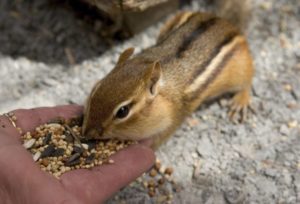 It’s hard to go wrong with feeding chipmunks seeds, nuts and fresh vegetables. Chipmunks will additionally require the occasional small bugs in their diet. This can include meal-worms, crickets, maggots and grasshoppers. While they search for each one of these in their natural habitat, if in human care, chipmunks need these vital sources of protein. It’s important that the bugs, seeds, and plants you do end up feeding a chipmunks is free from insecticides and pesticides of all forms. Insecticides and pesticides can be fatal on to chipmunks.
It’s hard to go wrong with feeding chipmunks seeds, nuts and fresh vegetables. Chipmunks will additionally require the occasional small bugs in their diet. This can include meal-worms, crickets, maggots and grasshoppers. While they search for each one of these in their natural habitat, if in human care, chipmunks need these vital sources of protein. It’s important that the bugs, seeds, and plants you do end up feeding a chipmunks is free from insecticides and pesticides of all forms. Insecticides and pesticides can be fatal on to chipmunks.
Chipmunks Aren’t Picky Eaters
Apart from the natural foods that they eat, it has additionally been witnessed that they enjoy a number of types of ‘human being food’. They have been on record to eat bakery dough, sugars, cookies, cooked goods, bread portions, chips and so on.
That Doesn’t Mean You Should Feed Chipmunks Junk Food
While it may be fun to watch your pet chipmunk chow down on human junk food, this 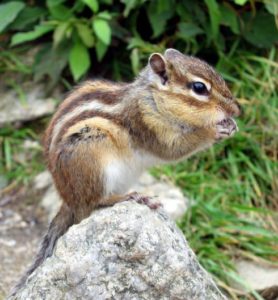 should be carefully monitored. An excessive amount of sugar or breads could be very harmful. There are many out there that say that rodents shouldn’t eat bread at all. Chicken with the bone still on it should be avoided because of potential bone fragments.
should be carefully monitored. An excessive amount of sugar or breads could be very harmful. There are many out there that say that rodents shouldn’t eat bread at all. Chicken with the bone still on it should be avoided because of potential bone fragments.
Chipmunks that are in consistent contact with humans, will eat snacks that are handed to them. Feeding chipmunks in Estes Park is even advertised by the National Park Service. But have caution in what you feed chipmunks if you care about their health. We all like junk food. But it should be consumed in moderation.
A Non exhaustive List of Healthy Chipmunk Food
Like we mentioned above, chipmunks can eat lots of things. You’re always safe with fruits and vegetables.
Chipmunks are small members of the squirrel family. So anything a squirrel can eat is safe for a chipmunk.
The largest chipmunk is the eastern chipmunk, which grows up to 11 inches and weighs as much as 4.4 ounces. The smallest chipmunk is the least chipmunk, which grows up to 8.5 inches and weighs up to 1.8 ounces. Depending on species, chipmunks can be gray to reddish-brown in color with contrasting dark and light stripes on the sides of their face and across their back and tail. All species eat the same things.
What do chipmunks eat? The following foods:
Do Chipmunks Eat Apples?
• Apples. The seeds might be more enjoyable than the apple.
• Applesauce. Feed them very little if the applesauce has lots of sugar or other fattening ingredients.
Other Foods for Chipmunks
• Apricots.
• Avocados. These are very fatty for chipmunks and should be given in moderation. Be careful of the avocado skin.
• Bananas. My chipmunks love it when I smash the bananas up like pudding and add nuts or other fruits.
• Beef. Chicken is healthier for your chipmunk, but beef is okay if the fat is kept to a minimum.
• Blackberries.
• Blueberries. Be careful when feeding these to your chipmunks because they can be messy!
• Blueberry buckle baby food.
• Boysenberries.
• Bread. While my chipmunks love bread and haven’t had any problems, I’ve read some 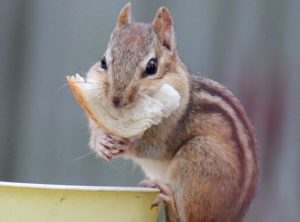 articles about chipmunks choking on bread. I would recommend feeding only very small pieces to your chipmunks and toasting it first. You may even soften the bread by dipping it in milk or water.
articles about chipmunks choking on bread. I would recommend feeding only very small pieces to your chipmunks and toasting it first. You may even soften the bread by dipping it in milk or water.
• Broccoli.
• Butternut squash. Make sure that the squash is thoroughly cooked before feeding it to your chipmunk. What Do Chipmunks Eat in the wild? Their normally not so lucky to eat squash.
• Cantaloupe.
• Carrots.
• Cashews.
• Cauliflower.
• Celery. This vegetable is fine for chipmunks, but it doesn’t have very much nutritional value.
• Cheese. Small amounts are okay for chipmunks. Soy-based cheese is healthier for them.
Safe foods for chipmunks include grapes, carrots, and cucumbers.
• Cherries.
• Chicken. This is the healthiest meat for your chipmunk.
• Chicken bones. Surprisingly, these are not only healthy for chipmunks but also good chew toys. Next time you have chicken for dinner, save the bones.
• Choy.
• Cold cuts.
• Cooked sweet potatoes.
• Corn. Corn is good for your chipmunks whether it is on the cob, from the can, or even frozen.
• Cottage cheese.
• Cranberries.
• Cream cheese on crackers.
• Cucumber.
• Dog food. People who make their own chipmunk food will often add dog food to the mix. However, you don’t want to skimp on quality, and you want to get a low-protein type of food.
• Dried bananas. These are great for chipmunks because they are high in potassium.
• Dried cranberries. If your chipmunk is prone to urinary tract infections, this is great to add to its diet. Cranberries are good for keeping the urinary tract clean and healthy.
• Dry cereal. Cheerios are great for feeding your chipmunk. However, be careful about feeding your it cereal that contains a large amount of sugar. Puffed rice cereals are yummy for chipmunks, but avoid rice krispies and other sugary choices.
• Dry rolled oats. Any type of oats is fine as long as it does not contain any sugar.
• Fruit baby food.
• Grapes. Purple grapes are believed to prevent cancer in chipmunks.
• Green beans. Cooked green beans are very nutritious.
• Green peppers. Just make sure they aren’t too spicy for your chipmunks and try to feed them in small amounts at a time.
• Ham.
• Hard boiled eggs. These should not be fed to your chipmunk on a regular basis, just as a treat once in a while. I’ve heard that these are good for pregnant chipmunks because of the fat and extra protein.
• Honeydew melons.
• Kale.
• Kiwi.
• Lettuce. Romaine lettuce is the best for your chipmunk because it has more nutritional value than iceberg. Some people will tell you to avoid iceberg lettuce altogether because it has close to no nutritional value.
• Macaroni and cheese.
• Mashed potatoes.
• Mealworm.
• Meat baby food – An unusual answer to the question What Do Chipmunks Eat?
• Melons.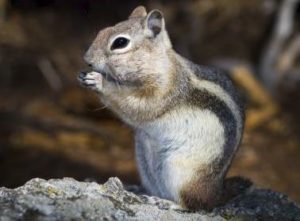 • Mushrooms. These are only okay for your chipmunk if they are cooked and should be fed in modechipmunkion.
• Mushrooms. These are only okay for your chipmunk if they are cooked and should be fed in modechipmunkion.
• Oatmeal.
• Oatmeal cookies.
• Papaya.
• Parsley.
• Pasta. Chipmunks can have cooked or dried pasta. They find tri-colored spirals that have a spinach or tomato flavor extra tasty. Dried pasta is good because it is crunchy and they like to chew on it. Pasta has a great source of carbohydchipmunkes, which are good for chipmunks.
• Peaches. Make sure to remove the pit from peaches because it can be harmful.
• Pears.
• Peas.
• Plums.
• Pomegranates.
• Popcorn. It should be unsalted and unbuttered if possible.
• Popsicles. These are great for chipmunks on hot summer days. However, try to only feed your chipmunks non-fat and sugar-free popsicles.
• Potatoes.
• Pumpkins. Pumpkins are fine for chipmunks to eat. However, the seeds are high in fat and should be fed to your pet in modechipmunkion.
Feel free to feed your chipmunk strawberries, scrambled eggs, and rice.
• Raspberries.
• Red peppers. Test the pepper first to make sure it isn’t too spicy. Then feed only small amounts of it to your chipmunk at a time.
• Rice. Brown rice is especially good for your chipmunk.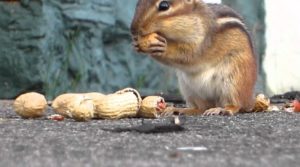
• Saltine crackers. My chipmunks love these as snacks. I keep a small sack of them by my chair and feed them crackers when they want a snack. I try not to overdo it though because the crackers are high in salt and I’m not sure if too much would make them sick.
• Scrambled eggs. The protein is great for chipmunks, especially pregnant chipmunks.
• Small dog treats. Small treats are ideal because chipmunks should only have treats in small portions. You can always cut up larger treats into smaller ones—you may even need to do the same with small treats.
• Soy products. Soy nuts are good for chipmunks, but make sure they are roasted and unsalted. Soy products are high in protein and have cancer-preventing agents. Other good soy products include soy milk, soy yogurt, soy tofu, and soy crumbles.
• Squash. Cooked squash is best.
• Strawberries. Chipmunks love strawberries. They are not only sweet and yummy but also healthy for them.
• Sunflower seeds. Make sure that the seeds are unsalted. You can buy these cheaply in bulk and add some to your chipmunk’s cage every once in a while for a healthy snack.
• Turkey. Chicken is the better meat for your chipmunk, but small amounts of turkeys are fine too.
• Vanilla custard baby food.
• Vegetable baby food.
• Walnuts. Make sure to only feed your chipmunk these in modechipmunkion. They make a great treat every once in a while.
• Watermelon.
• Whole grain crackers. Add a little topping to the crackers for a wonderful little snack.
• Whole wheat pasta.
• Whole wheat bread.
• Yellow peppers. Peppers are fine for your chipmunks as long as they aren’t too spicy, so you may want to test it first.
• Yogurt. Probiotic yogurt in small amounts is good for the gut flora.
• Yogurt covered pretzels.
• Yogurt drops. Most chipmunks absolutely love these.
What Should You Feed a Chipmunk?
In captivity, chipmunks can be fed a diet of commercial dry or wet food formulated for small mammals, such as mice or hamsters. These diets should be high in protein and fat and low in fiber, and they should contain all the necessary vitamins and minerals to support the chipmunk’s health.
In addition to a commercial diet, chipmunks can also be given a variety of fresh fruits and vegetables as treats. Some good options include apples, bananas, berries, carrots, peas, and leafy greens. It is important to avoid giving chipmunks foods that are high in sugar or fat, as these can lead to obesity and other health problems.
It is also important to provide chipmunks with a clean, fresh source of water at all times. Water can be provided in a small bowl or water bottle, and the bowl or bottle should be cleaned and refilled daily.
It is important to remember that chipmunks are small animals with fast metabolism, and they will need to eat frequently throughout the day to meet their energy needs. It is a good idea to provide chipmunks with a constant supply of food and to monitor their food intake to make sure they are getting enough to eat.
Random Chipmunk Facts
Chipmunk are ground dwelling mammals. They construct burrows which can be up to 30 feet in length. Their home range may be up to 1/2 acre (0.2 ha), but the adults only defend a territory about 50 feet (15.2 m) around the burrow entrance.
Chipmunks are solitary animals but they will socialize during the breeding season and while rearing young.
Chipmunks are very puny and cute rodents found primarily in North America and Asian countries. Many animal lovers are eager to know What Do Chipmunks Eat. We are going to state some of the food which chipmunks love to eat –
- Bird seeds are one of the most favorite food of the chipmunks.
- A lot of individuals are still perplexed about whether chipmunks are herbivores or omnivores. Chipmunks are omnivores and they can easily eat small birds and their eggs.
- Apricot is another food item which chipmunks love to eat along with crickets.
- Chipmunks also loves to eat raisins, tomato, beans, and fresh bananas.
- Thistle flowers and flower bulbs of certain plants are also an integral part of Chipmunks diet.
Here are a few interesting facts about chipmunks:
Chipmunks are small, striped mammals that are native to North America and Eurasia. They are related to squirrels and are known for their distinctive black and white stripes and their ability to climb trees and burrow underground.
Chipmunks have large cheek pouches that they use to store food for later. They are known for gathering and caching seeds, nuts, and other plant material for the winter months.
Chipmunks are active during the day and sleep at night. They are known for their energetic and playful personalities and are often seen running and climbing through trees and bushes.
Chipmunks are omnivorous and will eat a wide variety of foods, including seeds, nuts, fruits, vegetables, and insects. They are also known to raid bird feeders and gardens for additional food sources.
Chipmunks are important to many ecosystems and play a vital role in the dispersal of seeds and the spread of plants. They are also important food sources for predators such as birds of prey and snakes.
When I was little we tried keeping a baby chipmunk we found as a pet. They do not make great pets!